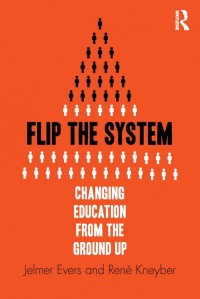 Today sees the formal launch of a new book – ‘Flip the system: Changing education from the ground up’.
Today sees the formal launch of a new book – ‘Flip the system: Changing education from the ground up’.
It is a major achievement – a book edited by two school teachers, Jelmer Evers and René Kneyber, from the Netherlands who saw that education in their country was travelling in the wrong direction, and who wanted to do something about that. First they wrote a book in Dutch, and the success it achieved encouraged them to produce an international equivalent. I am pleased to have a chapter in the edited collection, written with my co-author Alison Gilliland.
Jelmer and René’s frustration with education in the Netherlands is one shared by many teachers around the world. It is a frustration based on an out of control obsession with measurement and testing, the micro-management of teachers’ work, ever-intensifying workloads and the triumph of markets and competition over the public good and collaboration.
However, where Jelmer and René have performed a real service is they have gone beyond critique, and recognised that frustration is the consequence of opposition without action. Overcoming such frustration requires more than critique, and in this regard, Flip the System does much more than many other blogs and books that will be read over the summer when teachers take their well earned break. Specifically it does two things:
First, it offers a real analysis of why we are in the mess we are in. Education systems, in all their diversity and complexity, don’t just happen – they are not an accident. Nor are they the product of someone’s good (or bad) idea. Education ‘systems’ develop in complex ways, driven by powerful forces. At the moment, we see our education systems driven by the needs of the global economy. More than for a very long time, our education systems are subservient to the needs of international capital and the drive for ‘global competitiveness’. And the best way to produce young people for a world of growing insecurity and inequality is to make the places where they are educated behave as if they were businesses in a market. Schools compete, education is a race and parents and students are consumers – in school, college, university, as in life . . . the winner takes it all. This is neoliberalism – and Flip the System doesn’t duck that. Rather it reminds teachers that if they want to change the system, they must first understand why it is as it is.
Too often powerful critiques of what is wrong with education are followed by superficial analyses of the causes – usually focused on the failings of individual politicians. The problems in education are not caused by too much politics in education, but by too little. Education is always and everywhere political. The problem is that political decisions about education are increasingly directed by the invisible hand of the markets and business interests, rather than the outcome of genuine open debate amongst all those with an interest in education. The challenge is to make the invisible, visible and the private, public.
So how to do this?
This is the second area of analysis where Flip the System also has much more to offer than many other current efforts to analyse developments in education. Specifically, it recognises that if teachers want to ‘flip the system’ then they need to not only take action, but they must do so collectively. Every day teachers take actions that challenge the trajectory of neoliberal education policy. Every time they make a decision based on the individual need of a child rather than the imperative of market-driven targets, they buck the system. But individual acts of resistance can only ever achieve so much. System flipping requires much more concerted action – and the book acknowledges this.
In our contribution to the book Alison and I argue that teachers’ unions are the natural and obvious way to organise such collective action. Teacher unions are not the only ways that teachers can organise collectively. Teachers are naturally embedded in myriad collaborations and networks, both informal and formal. This is as it should be. But if teachers want to flip the system . . . seriously flip the system, then they have no option but to work together in organisations that provide them with a real voice. I have argued elsewhere that any organisation that claims to be a voice for teachers needs to be judged by three criteria:
- Independent
- Democratic
- Inclusive
Only teachers’ unions come close to meeting these three criteria. This does not mean teachers’ unions are perfect – far from it. Certainly they have flaws – it would be amazing if they didn’t. But they have a potential that no other organisation claiming to be the voice of teachers can come close to fulfilling.
In our contribution to Flip the System Alison and I argue that if you are proud of being a teacher then it is only logical to be active in the organisation that speaks for your profession. If you don’t like it as it is, then get involved to change it – that is the nature, and the beauty, of a democratic organisation.
However, what I want to argue here is that if you are serious about wanting to flip the system then you don’t have a choice – get organised.






 Today sees the formal launch of a new book – ‘
Today sees the formal launch of a new book – ‘